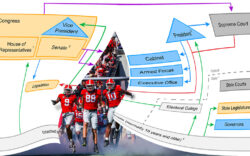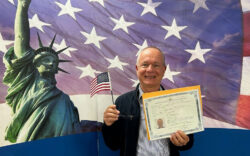This article was originally published in the Jan. 17, 2007 issue of Flagpole, around the time UGA held a conference reassessing the Carter presidency.
Jimmy Carter belongs to the world, but most Georgians have their own memories of him, and I have mine.
He was originally known politically as Jimmy Who? He seemed always to be running for something as an unknown. He was an unknown state senator when he first ran for governor, losing but knocking out the frontrunner, with the election finally being decided by the Georgia legislature, which of course chose Lester Maddox, because he was the Democrat, like most of the legislature in those days.
Then Carter ran again for governor, this time against Carl Sanders, who had been a popular, progressive governor previously, but couldn’t succeed himself under Georgia law at that time. When Sanders could run again, everybody just naturally assumed that he would be a shoo-in, but Jimmy Carter didn’t share that assumption. Since Sanders was the “liberal,” Carter had to run to the right of him, always a good strategy amongst our electorate. In the campaign, Carter dropped enough code words to assure the good old white boys that he was their man, and he beat the silk-stocking Atlanta lawyer, calling him “Cufflinks Carl,” a term originally coined by Republican gubernatorial candidate Jimmy Bentley. In his inaugural address, Gov. Carter announced that the days of racism were over in Georgia, causing the good old boys to start eyeing the Grand Old Party.
Among those assuming that Carl Sanders would win another term as governor were many administrators and department heads at the University of Georgia, which had benefited greatly from the Sanders administration’s emphasis on education. Although the university was usually careful to stay out of state politics, this time around Carl was their friend, and it never entered their minds that he wouldn’t win.
So when Carter won, the university had to scramble to make amends to the Georgia Tech graduate sitting in the governor’s chair. I was working at the UGA Institute of Government at the time, and my boss, Bill Collins, knew as much as anyone in Georgia about state government. He was also a friend of Carl Sanders. When Gov. Carter set about reorganizing the government, Collins arranged for him to come over to Athens for a dog and pony show to demonstrate what-all the institute could do to help.
We spent the day making presentations on our various areas of competence. Mine was thought to be the legislature, since I was working on a modernization plan for that body. So I got to make the pitch to the new governor on how the institute could help him give the General Assembly a makeover.
At that time in my life, I was living in a tin-roofed cabin out on Jefferson Road and taking long, early morning walks in the woods with my beagle. I cleaned up pretty well and came to work in a coat and tie, and that’s how I faced the governor when I began my presentation. I had already noticed his mannerism of opening his mouth and eyes wide for a moment every now and then, and after I realized that he wasn’t about to scream or laugh, I assumed it was some kind of relaxation mechanism for all the long meetings that filled his day.
I wasn’t disconcerted when he did that a couple of times during my pitch, but I did wonder why he was staring at my forehead while I talked, instead of looking me in the eye. As I finished, I felt a tickle, and when I could, I brushed at it, only to discover a wood tick that had been crawling across my forehead while I was demonstrating my expertise to the governor. I suddenly understood why I thought I had the impression that he hadn’t heard a word I had said.
That was the closest I ever got to President Carter. A lot of Georgians, including good friends of mine, went on to serve in his administration. I was not among them. I do not blame my beagle for keeping me out of the White House, nor do I blame my participation in a rebellion against Carter’s leadership in the Georgia delegation to the Democratic National Convention in Miami. Our crowd nominated Sen. George McGovern; Carter rightly admonished that McGovern could not win the presidency, but McGovern did pave the way for Carter by preparing the Democratic Party to nominate a more moderate candidate the next time around.
I voted enthusiastically for President Carter, and history shows that he accomplished solid achievements domestically and in foreign relations in spite of economic hard times brought on by OPEC oil embargoes and inflation. He has since gone on to walk with kings, but has kept the common touch. I hope the conference here this week that examines his presidency helps to show him the high regard in which he is now held at the University of Georgia. I’m sure he’s no longer ticked off.
Like what you just read? Support Flagpole by making a donation today. Every dollar you give helps fund our ongoing mission to provide Athens with quality, independent journalism.










